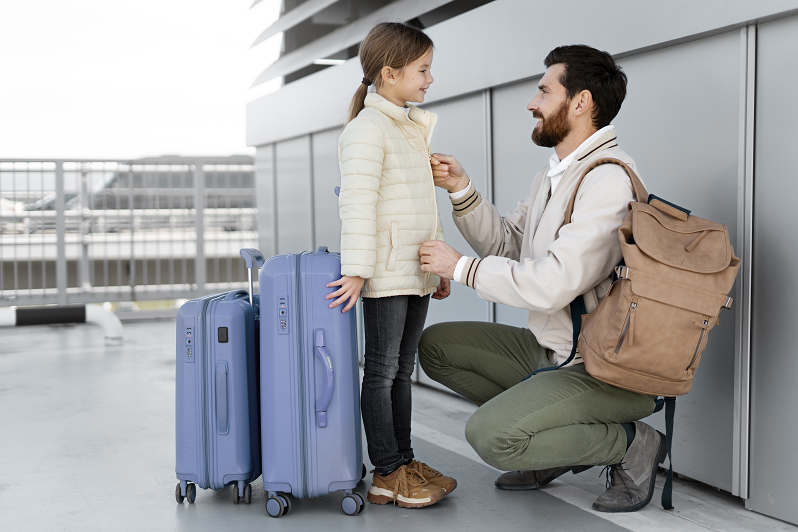Traveling can be a thrilling and enriching experience for people of all ages, including children. However, when it comes to minors traveling without parents or legal guardians, there are specific legal requirements that must be met to ensure their safety and proper documentation. In this comprehensive article, we will delve into the importance of an authorization letter for minors traveling alone or with someone other than their parents. We will discuss the essential information this letter should contain and explore its role in ensuring smooth international travel for minors traveling without parents.
Furthermore, we will shed light on the benefits of seeking legal assistance from reputable firms like HHS UAE Lawyers to navigate the complex legal landscape associated with children’s travel authorization.
Understanding the Authorization Letter: Child Travel Consent Form
An authorization letter, also known as a consent letter or parental consent letter or Child Travel Consent form, is a document issued by a child’s parent or legal guardian that grants permission for the minor to travel without them. It serves as a crucial form of identification and ensures that border control authorities and airline personnel are aware of the minor’s travel arrangements. The letter clarifies that the child is not being abducted and that the trip is authorized by the parents or legal guardians.
Need Legal Help?
Dubai's Expert Advice at Your Fingertips.
Essential Information to Include in the Authorization Letter
i. Child’s Information
The authorization letter should begin with comprehensive details about the child, including their full name, as it appears on official documents, date of birth to verify the child’s age and identity, and passport number if applicable. These details ensure that the child’s identity is well-established, and the letter is linked to the correct individual.
ii. Parent/Legal Guardian Information
Next, the letter must include the full name of the parent or legal guardian granting consent. Additionally, contact details such as phone number, email address, and residential address should be provided to establish effective communication with the parents or guardians if necessary. Including the passport or ID number of the consenting parent or guardian further strengthens the letter’s authenticity and confirms their authority to grant permission.
iii. Travel Details
The authorization letter should specify the destination country or countries where the child will be traveling. This information is vital for border control authorities and airline personnel to identify the child’s intended travel route. Along with the destination details, the letter should mention the departure and return dates, providing a clear timeline for the travel itinerary. Additionally, stating the purpose of the trip, whether it is a vacation, school trip, family visit, or educational program, helps explain the reason for travel and the legitimacy of the journey.
iv. Authorized Traveler Information
If the child will be accompanied by another individual during the trip, the letter must include the full name of the authorized traveler and their relationship to the child. Whether it is a teacher, relative, or family friend, this information clarifies the person responsible for the child during the journey, ensuring their safety and well-being throughout.
v. Notarization
The final and critical step in ensuring the letter’s legal validity is notarization. The authorization letter must be notarized by a recognized authority to confirm its authenticity. Notarization involves the verification of the document’s signatures and seals by a notary public or another authorized official. This legal certification adds an extra layer of credibility to the authorization letter, making it a reliable document for international travel.
Ensuring Legal Compliance
Different countries have varying requirements for the authorization letter format and content. It is essential to research the specific regulations of the destination country and any transit countries. Some countries may require the letter to be translated into the local language, while others may require additional supporting documents, such as a copy of the child’s birth certificate or a legal custody document if applicable.
Read in detail: Affidavit of Parental Consent for Travel of a Minor Child in the UAE
Need Legal Help?
Dubai's Expert Advice at Your Fingertips.
Obtaining legal assistance from HHS Dubai Lawyers
Navigating the legal requirements for minors traveling without parents can be overwhelming. This is where the expertise of HHS Lawyers can be invaluable. With years of experience in family and travel law, their team of skilled attorneys can guide parents and guardians through the entire process, ensuring that all necessary documentation is prepared correctly and meets the legal standards of the destination country. The team at HHS Lawyers in Dubai understands the importance of ensuring a smooth travel experience for minors while adhering to the legal requirements. Their services include:
- Authorization Letter Preparation
Drafting and notarizing authorization letters tailored to the specific requirements of the destination country.
- Legal Consultation
Offering expert advice on the documentation needed for traveling minors, ensuring parents are well-informed and confident in their decisions.
- Document Review
Thoroughly reviewing all travel-related documents to avoid any potential issues or delays at immigration and customs.
- Handling Complex Cases
Assisting in complex cases involving custody disputes or legal complexities that may arise during travel.
Conclusion:
It can be an exciting and educational experience for minors traveling without parents. However, it requires careful planning and compliance with legal regulations. Obtaining an authorization letter is a crucial step in ensuring a smooth journey for the child. With the legal expertise and assistance of HHS Lawyers in Dubai, parents and guardians can confidently navigate the process, making their child’s travel experience safe and memorable.
Remember, when it comes to minors’ travel, having the right legal support can make all the difference.

